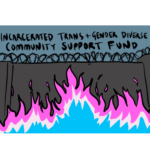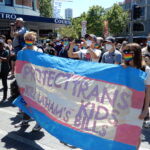Manslaughter of Mhelody Bruno Exposes Institutional Bias in Criminal Justice System

The outcome of the trial of Rian Toyer – the former Royal Australian Air Force officer guilty of the manslaughter of Mhelody Bruno – has raised warranted questions around systemic bias within the Australian criminal justice system and the privilege it bestows upon some.
Mhelody was a Filipina transgender woman holidaying in this country, when she died in a Wagga Wagga hospital on 22 September 2019, after then RAAF corporal Toyer chocked her to the point of unconsciousness during sex the day prior.
When NSW police named the investigation into the 25-year-old’s death, Strick Force Lamson – a slang word referring to an aspect of anal sex – it was apparent that Australian authorities weren’t going to take the matter seriously.
But none of her supporters were expecting that, on Toyer having plead guilty, NSW District Court Judge Gordon Lerve would simply let the white Australian man walk free, as, on 19 March, he imposed a 22 month Intensive Correction Order (ICO) to be served in the community.
Indeed, the NSW Director of Public Prosecutions had an issue with the sentence as well, as manslaughter requires real prison time.
So, Justice Lerve resentenced Toyer on 29 March to 22 months imprisonment, with non-parole set at 12 months.
But the judicial officer made clear that sending the now former corporal to prison was a “matter of considerable regret” to him.

White male privilege
“There are factors that contributed to the very light sentencing,” said Genesis Mansilongan, a spokesperson for Filipino democratic youth group Anakbayan Sydney. “We see transphobia coming through the system.”
“It’s the boy’s club, with Justice Lerve – also in the RAAF – protecting his own,” he continued.
“At the Sydney rally, Tashynga said there’s no justice on stolen land for people of colour, for First Nations people, or anyone who isn’t the epitome of what Lerve and Toyer are – white male privilege.”
A large protest for Mhelody gathered at Sydney Town Hall on 29 March. It was in opposition to the ICO sentence, but all were adamant that the new sentence handed down earlier that day didn’t see justice brought.
A similar vigil and march took place in Melbourne on Tuesday, which conveyed the same sentiment.
Didn’t consent to be killed
Toyer, now 33, told the court that he’d met Mhelody three weeks prior to her death on Grindr, and he’d choked her to the point that she became unconscious in his Wagga Wagga apartment on the morning of 21 September 2019.
As he initially imposed the community service order, Justice Lerve said he was “satisfied on balance” that Mhelody “not only consented to the act of choking but actually instigated it” the first time it happened.
Lerve further found that while the pair had “no discussion as to the boundaries, there was an understanding the deceased would tap the offender’s arm if she was distressed or wanted him to stop the choking.”
Sydney-based artist Bhenji Ra said in the lead up to the resentencing that what should have been considered is “Mhelody never consented to being killed”. And she added that a person has to choke another for quite a long time to see them unconscious.
Justice Lerve assessed the crime was “towards the lower end on the scale of seriousness for matters of manslaughter”. And he found the fact that the RAAF terminated Toyer’s employment over the case amounted to extra-curial punishment, which he considered as a mitigating factor in sentencing.
Justice pending
Mhelody worked in a Manila call centre and she financially supported her family via her employment. The Brunos are a farming family, who live in the southern province of Surigao del Sur: one of the poorer regions of the Philippines.
“The family does not see this as justice for the loss of their daughter,” Genesis told Sydney Criminal Lawyers. “There still hasn’t been any consultation from the NSW government, the Australian government or the Philippine government.”
Transgender people globally are subjected to high levels of violence. And due to widespread prejudice, crimes against trans people often don’t receive the attention or level of seriousness afforded by justice systems to other members of the community.
While there hasn’t been much of a mainstream media outcry over the lack of justice given to a vacationer in our country following her death, coverage in the alternate media has been growing, along with support in the community.
“Mhelody was the main breadwinner. There needs to be compensation for her family,” Genesis concluded. “And the justice system needs to make sure that Toyer’s sentence is equivalent to the murder of another human being.”







